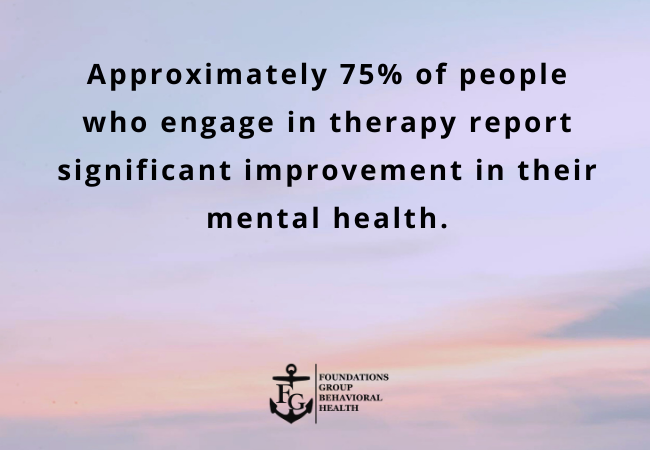Starting therapy is a big, brave step toward improving your mental health. Whether you’re participating in Outpatient Mental Health Therapy Massachusetts, enrolling in Psychiatric Day Treatment Massachusetts, or engaging with one of our specialized programs like the Anxiety Treatment Program Massachusetts or Trauma Disorder Treatment Program Massachusetts, knowing how to make the most of your sessions will empower your journey toward healing.
Therapy works best when it’s a partnership between you and your therapist. The more you engage, the more you can benefit from each conversation, insight, and strategy shared along the way. At Foundations Group Behavioral Health, we are committed to helping you feel prepared, supported, and confident in every step of your therapy experience.
In this comprehensive guide, you’ll discover practical tips to maximize your therapy sessions and turn each visit into meaningful progress.
1. Set Clear, Honest Goals for Your Therapy
Before you even step into the therapy room, think about what you want to achieve. Are you looking to:
- Reduce anxiety and panic attacks?
- Heal from trauma?
- Improve communication in relationships?
- Build emotional resilience?
Clear goals help guide your therapist in designing your treatment plan. In programs like our Anxiety Treatment Program Massachusetts or Depressive Disorder Treatment Program Massachusetts, we work closely with you to establish goals that feel personal and achievable.
Pro Tip: Even if you aren’t sure what your goals are yet, that’s okay! Your therapist will help you define them over time.
2. Be Open and Honest — Even When It’s Hard
It’s normal to feel hesitant about sharing personal thoughts and experiences, especially at the beginning. But remember: therapy is a safe, confidential space. The more open you are, the more tailored and effective your therapy can be.
At Behavioral Health Treatment Center Massachusetts, our compassionate team creates an environment of trust, so you can comfortably discuss difficult emotions and situations. Whether you’re in Half Day Treatment Program Massachusetts or regular outpatient therapy, honesty accelerates healing.
3. Consistency Is Key
Like any form of growth, consistency matters. Attend your sessions regularly, whether you’re in Outpatient Mental Health Therapy Massachusetts once a week, or attending more intensive sessions in Psychiatric Day Treatment Massachusetts.
Missing sessions can disrupt momentum and slow progress. Commit to the process, even when you feel tempted to skip a week.
4. Come Prepared for Each Session
Take a few minutes before each session to reflect:
- What have you been feeling since the last session?
- Were there specific challenges or successes?
- Are there patterns or triggers you’ve noticed?
Jot down thoughts in a journal or your phone notes. Bringing these reflections to your therapist provides valuable material for your conversations. Many clients in our Mental Health Treatment Programs Massachusetts find that preparation enhances session depth and efficiency.
5. Practice Outside of Sessions
Therapy isn’t just what happens in the office or over a video call. True progress happens when you apply what you learn between sessions.
Your therapist will likely assign “homework” — such as practicing coping strategies, journaling, or mindfulness exercises. In our Trauma Disorder Treatment Program Massachusetts, practicing grounding techniques outside of therapy is essential for managing triggers.
The more you engage outside of sessions, the quicker you’ll see progress.
6. Be Patient with Yourself
Healing is not linear. There will be breakthroughs and setbacks, easy weeks and tough ones. Give yourself permission to experience the full range of emotions and understand that progress takes time.
Programs like our Half Day Treatment Program Massachusetts and Psychiatric Day Treatment Massachusetts are designed to offer continuous support through these natural ups and downs. Your therapist will walk with you through every step of your healing journey.
7. Communicate with Your Therapist About What Works
Therapy is a collaboration. If something isn’t resonating with you, let your therapist know. They can adjust their approach to better suit your needs.
For example:
- Prefer structured exercises over open conversations? Share that.
- Need more focus on coping skills? Speak up.
- Want to dive deeper into past experiences? Mention it.
At Foundations Group Behavioral Health, we believe your voice is essential in shaping your care experience.
8. Celebrate Small Wins
Every step forward deserves recognition. Managed a panic attack successfully? Opened up in session? Practiced a grounding exercise during a tough moment? Celebrate it.
Our clinicians at Behavioral Health Treatment Center Massachusetts encourage clients to recognize and celebrate these milestones, no matter how small they may seem.
9. Utilize the Support of Specialized Programs
If you’re dealing with specific challenges like trauma, anxiety, or depression, enrolling in a focused program can provide targeted support.
At Foundations Group Behavioral Health, we offer:
- Anxiety Treatment Program Massachusetts: Targeted strategies to manage worry, panic, and fear.
- Depressive Disorder Treatment Program Massachusetts: Supportive approaches to lift mood and build hope.
- Trauma Disorder Treatment Program Massachusetts: Trauma-informed care to process painful memories safely.
- And more, within our full spectrum of Mental Health Treatment Programs Massachusetts.
Specialized programs provide a deeper dive into your unique needs, helping you get more from every therapy session.

10. Understand the Role of Medication (If Applicable)
For many clients, therapy works in tandem with medication management. In outpatient therapy, or higher levels like our Psychiatric Day Treatment Massachusetts, clinicians monitor medication carefully to ensure it supports your therapy goals.
If you’re prescribed medication, communicate openly about how it makes you feel. Adjustments can make a big difference in how effectively you engage in therapy.
11. Build Your Support Network Outside of Therapy
While therapy is a cornerstone of your recovery, additional support strengthens your foundation. Engage trusted friends, family, or peer support groups. They can provide encouragement between sessions and help you apply strategies in real-world situations.
Many clients in our Half Day Treatment Program Massachusetts and IOP settings build connections that last well beyond treatment.
12. Be Open to Different Modalities
At Foundations Group Behavioral Health, we offer a range of therapeutic approaches, including:
- Cognitive Behavioral Therapy (CBT)
- Trauma-Focused Therapy
- Mindfulness-Based Stress Reduction
- Group therapy dynamics
Each approach offers different benefits. Stay open to exploring various modalities to discover what resonates most with your healing journey.
Why Choose Foundations Group Behavioral Health?
At Foundations Group Behavioral Health, we understand that starting therapy is a deeply personal decision — and we’re honored to be part of your journey. Our mission is to empower every individual with personalized care, expert guidance, and a supportive environment where healing can truly happen.
Here’s why so many across Massachusetts trust us with their mental health care:
- Comprehensive Mental Health Programs
From Outpatient Mental Health Therapy Massachusetts to intensive options like Psychiatric Day Treatment Massachusetts, we offer a full spectrum of services tailored to your needs. - Specialized Programs for Your Unique Challenges
Whether you’re managing anxiety, depression, or trauma, we provide focused programs such as our Anxiety Treatment Program Massachusetts, Depressive Disorder Treatment Program Massachusetts, and Trauma Disorder Treatment Program Massachusetts. - Integrated Medication Management
Our expert clinicians ensure seamless medication support across all levels of care, providing safe, effective treatments that complement your therapy sessions.
Conclusion
Therapy is more than a place to talk — it’s a place to grow, heal, and transform. Whether you’re starting with Outpatient Mental Health Therapy Massachusetts, stepping into Psychiatric Day Treatment Massachusetts, or finding specialized support in our Anxiety Treatment Program Massachusetts or Trauma Disorder Treatment Program Massachusetts, these tips will help you maximize your time in therapy and accelerate your progress.
At Foundations Group Behavioral Health, we are honored to partner with you. Our mission is to provide compassionate, personalized care at every step of your journey. Take the next step today. Call us at 888.685.9730 to begin your therapy journey and learn how we can help you build a stronger, healthier future.
FAQ on Therapy Sessions
How can I prepare for my therapy sessions?
Take time to reflect on your week, jot down any emotional triggers, challenges, or wins. Preparation helps focus your session and enhances progress. At Foundations Group Behavioral Health, our Outpatient Mental Health Therapy Massachusetts team encourages thoughtful preparation to maximize session value.
Is it normal to feel nervous before therapy?
Absolutely. Many first-timers feel anxious. Rest assured, therapy is a safe and supportive environment. Programs like our Psychiatric Day Treatment Massachusetts are designed to ease you into the process with compassion.
How often should I attend therapy to see results?
Frequency depends on your needs. Some attend weekly Outpatient Mental Health Therapy Massachusetts, while others benefit from more intensive options like Half Day Treatment Program Massachusetts or Psychiatric Day Treatment Massachusetts.
Can I combine therapy with medication management?
Yes! Many clients benefit from a combination of therapy and medication management. We provide integrated support in all our Mental Health Treatment Programs Massachusetts, ensuring cohesive care.
What if I feel therapy isn’t working?
Openly communicate with your therapist. Therapy is a partnership, and your feedback helps tailor the approach. We adjust strategies in programs like our Anxiety Treatment Program Massachusetts to meet your evolving needs.
Will therapy help with trauma recovery?
Yes. Our Trauma Disorder Treatment Program Massachusetts offers trauma-informed care that helps you process past experiences safely and build resilience.
How do I stay motivated between sessions?
Practice your coping skills, celebrate small wins, and stay connected with your support network. Your therapist at Behavioral Health Treatment Center Massachusetts can also suggest exercises and mindfulness practices to keep you engaged.








